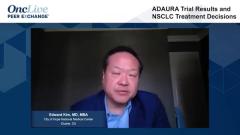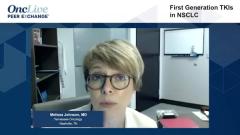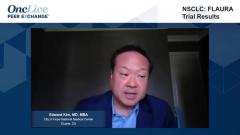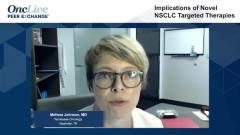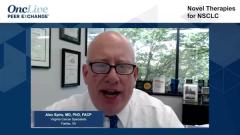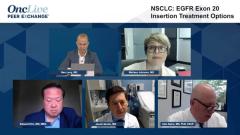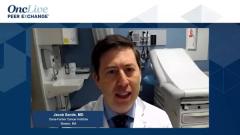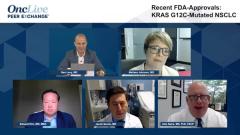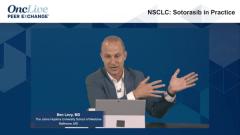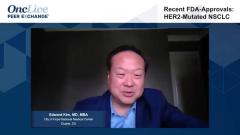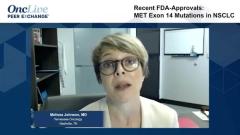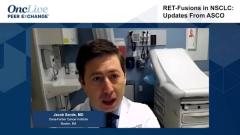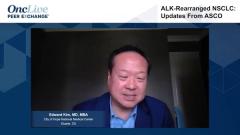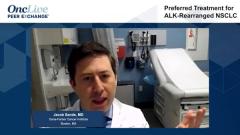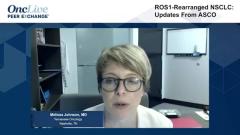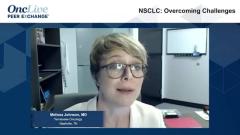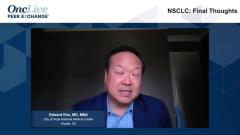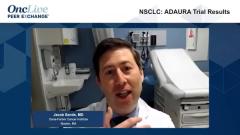
ROS1-Rearranged NSCLC: Updates FromASCO
An overview of TKIs in ROS1-rearranged non–small cell lung cancer (NSCLC) and updated trial results that were presented at the American Society of Clinical Oncology (ASCO) 2021 annual meeting.
Episodes in this series

Benjamin Levy, MD:Let’s move on. We’ve got a couple of other things to talk about. Another gene fusion, ROS1. Clearly, we’ve got data that’s come out. We’ve got crizotinib and entrectinib both approved for ROS1-rearranged lung cancer. We’ve got newer data that was presented at ASCOs [American Society of Clinical Oncology meeting] with repotrectinib and had some updates. Alex, just a brief overview of these drugs in the ROS1 space, what you generally use for ROS1 and where you think we’re heading. And then Melissa can talk about some of the data from ASCO.
Alex Spira, MD, PhD, FACP: Very quickly here we are rounding third with we’re going to have the 1% of patients which is important but obviously low numbers. Crizotinib has been approved since 2014, standard of care. I’m an entrectinib user. It is slightly better, at least based upon the anecdotal data. I also believe it’s slightly better tolerated, that’s been my go-to. Just a quick update in repotrectinib. This company, Turning Point Therapeutics, is finding its niche in low numbers of tumors that they’re able to develop new drugs in. But, if you look at their data presented here, response rates in patients that got multiple TKIs [tyrosine kinase inhibitor] and chemotherapy. ROS1, 2 prior TKIs without platinum-based therapy, 40% response rate, pretty impressive for this third-line setting, as well as with chemotherapy as well. I think it works. It’s probably going to be a better drug. It had slightly more adverse effects but certainly fills a niche, and these patients tend to do well.
Benjamin Levy, MD:It’s pretty incredible. If you do cross-trial comparisons between frontline crizotinib for ROS1-rearranged lung cancer and frontline entrectinib for ROS1-rearranged lung cancer, 53 patients in both studies, response rates are almost the same at 70%. PFS [progression-free survival] identical I believe at 19 months. I guess the entrectinib data did show intracranial response rates that we didn’t see with crizotinib. Melissa, which ROS1-directed therapy do you usually go to in this setting?
Melissa Johnson, MD: I have to say that the entrectinib data changed my practice. I now start with entrectinib where before had only given crizotinib, and the new data at ASCO was about brigatinib in ROS1-rearranged cancers, and after crizotinib how does that look? Response rate was 26% in the previously treated cohort, now we have to counter that with, well, what if they had entrectinib rather than crizotinib first, can we expect that or can we expect a different response rate? We’ll see the same arguments that played out with ALK, play out with ROS1 as well. There was also a new ROS1, ROS, and NTRK-targeted therapy, taletrectinib. I hadn’t heard of it before. Reporting its phase 2 results, the phase 2 study called TRUST by a company, Chinese company called AnHeart Therapeutics, which I liked. The phase 2 trial is small and it was interim results, but the response rate in, were all frontline patients, response rate 100%, 80% had treatment-related adverse events. The data was new, they didn’t have a duration of response or a PFS, so more to come there but maybe a third ROS TRK therapy entering the clinic.
Benjamin Levy, MD:Nice overview. Jacob, how you use crizotinib or entrectinib, why you use one of them, and where we think we’re heading with this?
Jacob Sands, MD: It’s exciting. This is one of those spaces that shows how much is happening in targeted therapy because we’re now seeing more options and it’s becoming a debate. I’ve leaned more toward entrectinib with its approval, but it is exciting to see more and more options be put into the space, especially when you’re talking about such a rare diagnosis to have multiple options really speaks to the fact that we are fully into this targeted therapy era.
Benjamin Levy, MD:It’s exciting. We’ve been fortunate enough to participate in the repotrectinib study, and that drug has real, as Alex mentioned, some meaningful activity post crizotinib and post crizotinib plus chemotherapy. I mean, this has got a real, again, from a company that’s diving into the resistance setting in these rare molecular niches, these drugs are looking promising. Ed, your decision point between criz [crizotinib] and entrectinib for ROS-rearranged lung cancer?
Edward Kim, MD, MBA: I tend to go with entrectinib as well. I don’t really see a ton of these. They’re hard to find and then they appear when you least expect it.
Benjamin Levy, MD:We’re going to move to our last genotype just briefly because I’m going to be transparent and tell you I haven’t identified an NTRK fusion yet. I’m still looking. Remember, these are fusions. I’ve identified a couple of point mutations that you’re going to pick up on the noise on the next-generation sequencing. Just be mindful it’s the fusion that actually predicts response of these drugs and not the point mutation. Panel, any thoughts on larotrectinib vs entrectinib and have any of you used these drugs for NTRK fusion in lung cancer or other solid tumor malignancies? Again, these are rare fusions in lung cancer. They’re more common in very rare tumors but rare in common tumors. Alex, I see you nodding your head here.
Alex Spira, MD, PhD, FACP: I’m laughing for 2 reasons. One, I beat you by one. I have one patient on entrectinib and she had a complete response ongoing for 3 years. She was on the clinical study way back when before it was approved. And that’s probably one of the reasons I use entrectinib for ROS, creature out of habit. I gave entrectinib for that and my next ROS1 again. Rare tumor types, I can count them, less than one hand of all these. Do I think there’s a difference? I don’t think so.
Benjamin Levy, MD:Any other, from the panel, their use of larotrectinib or entrectinib? Has anyone else identified an NTRK fusion? Going once. Ed?
Edward Kim, MD, MBA: We’ve had a couple in our system we had 7, actually.
Benjamin Levy, MD:Wow.
Edward Kim, MD, MBA: Previous system. One of the things, Ben, we want to advise folks is that not all the NGS tests cover all the variants, right? We’re missing stuff out there unknowingly.
TRANSCRIPT EDITED FOR CLARITY


